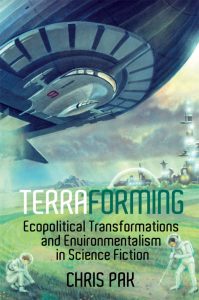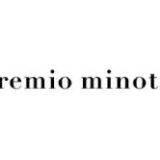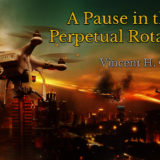To the layman in science fiction fandom (if there is such a thing), the notion of modifying a planet’s environment to meet the needs of humanity with the sole intention of habitable population has come to be known as terraforming. This popular hypothetical technology has been used by countless writers to help place man far beyond the limits of our own marble rock. Over time, terraforming has grown into an accepted “what-if” element in literature and film, often bypassing the social, political, and economic costs such an endeavor would face and jumping straight to the next phase of humanity as future civilizations travel to the stars.
Possibilities and problems are the core of any speculative idea and inevitably the nucleus of that which has come to be known as the human condition. Strong civilizations thrive on the what-if.
 Just like the wonder of the speculation itself, the emergence of the fantastic notion and how the idea has influenced science fiction over the years is both fascinating and inspiring. And this is where Terraforming: Ecopolitical Transformations and Environmentalism in Science Fiction by Chris Pak comes in. Fresh from Liverpool University Press and derived from research conducted in the Department of English at the University of Liverpool, the book takes readers through time, examining the historical progression of terraforming in science fiction.
Just like the wonder of the speculation itself, the emergence of the fantastic notion and how the idea has influenced science fiction over the years is both fascinating and inspiring. And this is where Terraforming: Ecopolitical Transformations and Environmentalism in Science Fiction by Chris Pak comes in. Fresh from Liverpool University Press and derived from research conducted in the Department of English at the University of Liverpool, the book takes readers through time, examining the historical progression of terraforming in science fiction.
This book shows how the development of the idea evolved within science fiction dissertations long before scientific speculation and the anxiety surrounding environmental concerns became a political narrative. The author also helps readers understand the established relationship between contemporary philosophy on nature and the alien representations of environmental elements found in science fiction. The environmental movement might have influenced how terraforming was represented in literature, but in contrast, the works of writers like H.G. Wells and Kim Stanley Robinson have long offered resources for continued discussions in ecological and socio-political debates, encouraging further narratives from both the fictional and non-fictional world while bringing fresh awareness to a complex idea.
For the student, this is an in-depth investigation of the idea of terraforming, from the evolution of the theory to the complexity of the sciences and the moral exploitation the process may entice. Yes, it is a textbook, complete with a well-organized chronological table of contents and a closing index to help find those detailed elements that will help complete your own research paper. But it is also a document of discovery, written with an obvious passion for the subject.
For the science fiction writer, this is a hardbound reference librarian full of answers that will help keep your fantastical ideas true to the science, ensuring that your readers will believe in the what-if. Any world builder adamant about accuracy in their work will need this on their reference shelf. After all, terraforming is the most literal form of world building when you consider the process. Did I mention the easy to use index?
For the average fan of science, fiction, or science fiction, the book will simply make you think. Whether you are interested in the science, the technological limitations, the environmental challenges, the contemporary social implications, the political hurdles, or just the cool theory of the possibilities, the research compiled by Chris Pak will answer many questions. No doubt you’ll walk away with even more questions about how our world is shaped, but that is what a good book is supposed to do. It makes you think.
A renowned series in science fiction criticism centering on works from globally recognized scholars, Liverpool Science Fiction Texts and Studies has more than just a textbook here. Highlighting the popular speculative element, Terraforming: Ecopolitical Transformations and Environmentalism in Science Fiction by Chris Pak should be mandatory reading in a number of curricula spanning a wide range of academic studies. But the interest should not stop there. Any reader picking up this book, students and fans alike, will walk away with a better knowledge of how the idea of terraforming evolved and an even greater appreciation for these speculative notions from some of the most influential writers in science fiction.










